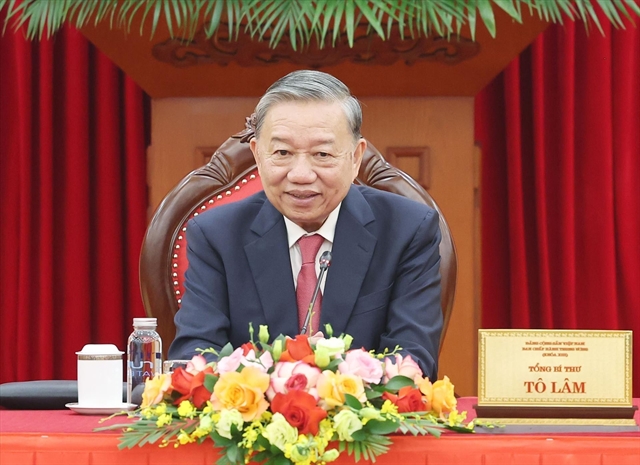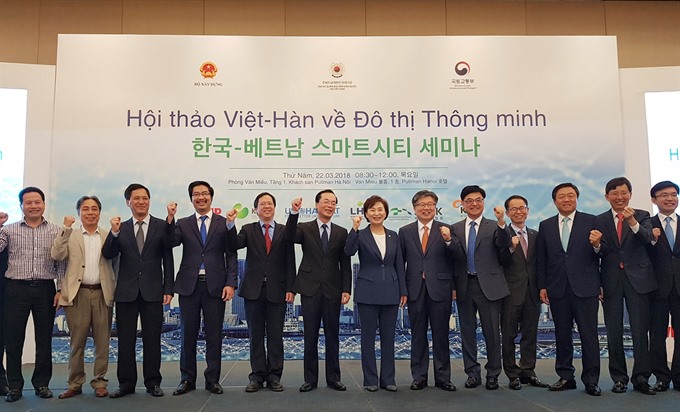 Politics & Law
Politics & Law

Developing smart cities will provide incentives for solving basic urban issues in Việt Nam, an official from the Ministry of Construction (MoC) said at a seminar on smart cities held in Hà Nội on Thursday.
 |
| Minister of Construction Phạm Hồng Hà (sixth from left) and South Korean Minister of Land, Infrastructure and Transport Kim Hyun-mi (seventh from left) take a photo with architectural and construction experts at a seminar on smart cities in Hà Nội on Thursday. — VNS Photo Bảo Hoa |
HÀ NỘI — Developing smart cities will provide solutions for basic urban issues in Việt Nam, an official from the Ministry of Construction (MoC) said at a seminar on smart cities held in Hà Nội on Thursday.
The seminar was held between Việt Nam and South Korea’s experts, within the framework of South Korean President Moon Jae-in’s State visit to Việt Nam.
Việt Nam’s Minister of Construction Phạm Hồng Hà and South Korean Minister of Land, Infrastructure and Transport Kim Hyun-mi attended the seminar.
Speaking at the seminar, Dr Lưu Đức Cường, director of MoC’s Urban Planning Institute – Rural Construction Department, said that he used to doubt whether it was “too early” to develop smart cities in Việt Nam since urban areas in the country were young and still struggling to solve basic problems.
“But after thorough research, I have come to the conclusion that turning these areas into smart cities will be ‘a shortcut’ that creates economic efficiency and helps them solve those very problems,” he said.
A smart city is a city that achieves sustainable development, uses effectively its infrastructure and has a friendly living environment by being constructed on a smart technology foundation, according to a research paper by Dr Trần Kim Chung, deputy director of the Central Institute for Economic Management under the Ministry of Planning and Investment.
There were 813 urban areas in Việt Nam by the end of 2017, according to Dr Trần Quốc Thái from MoC’s Urban Development Agency (UDA).
Việt Nam’s urbanisation rate has been growing in recent years and become relatively high compared to other countries in the region, he said, adding that the country has one new urban area each month and its urban population increases by some one million each year.
Although Việt Nam was ranked high in the e-Government Index (89/193 countries evaluated by the United Nations), Networked Readiness Index (79/139, evaluated by the World Economic Forum) and Accessibility to IT Service (3/139, WEF), the country is facing six major development challenges, Thái added.
These include lack of control of urban formulation and development, unsynchronised urban infrastructure, disintegrated urban database, as well as having no long-term orientation for the production of hardware and software for smart cities, underdeveloped market for smart cities, and limited readiness of urban human resources, he said.
At the seminar, South Korean experts shared their experience in planning and constructing smart cities, which dated back to the 1960s, as well as in applying smart technologies to add-on services such as public transportation, waste treatment, health care and community development.
Kim Hyun-mi, South Korean Minister of Land, Infrastructure and Transport, said she believes that the collaboration between the two countries at every stage of smart city development will help create new, innovative models of social development.
“We hope that the experts of the two countries will actively share their experiences to find a win-win collaborative model, and pave the way to a new ‘smart urban’ cooperation platform,” she said. — VNS